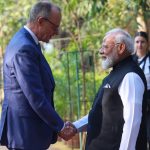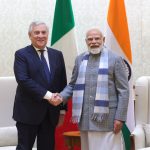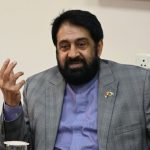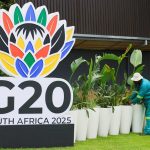 Russia’s military pact with Pakistan has triggered a wave of anxiety among India’s diplomatic-strategic establishment about the future of the much-touted special and privileged partnership between the two strategic partners. But Moscow feels such concerns are a gross-misreading, with President Vladimir Putin assuring that the pact with Pakistan was mainly aimed at counter-terrorism and underlined that it will only serve the long-term interests of India and Russia.
Russia’s military pact with Pakistan has triggered a wave of anxiety among India’s diplomatic-strategic establishment about the future of the much-touted special and privileged partnership between the two strategic partners. But Moscow feels such concerns are a gross-misreading, with President Vladimir Putin assuring that the pact with Pakistan was mainly aimed at counter-terrorism and underlined that it will only serve the long-term interests of India and Russia.
In a series of e-mail interviews with leading Indian dailies, President Putin, a day before his first summit meeting with India’s Prime Minister Narendra Modi, has underscored the nature of the special partnership between New Delhi and Moscow and allayed India’s concerns over Russia’s military pact with Pakistan.
“[Regarding] Pakistan, we have held talks on Russia’s possible assistance aimed at improving the counter-terrorism and anti-drug operations. In my view, this kind of cooperation serves the long-term interests of all countries of the region, including India,” Mr Putin told The Hindu in an e-mail interview.
Will do nothing detrimental: Russian envoy
 Russia’s long-standing ambassador to India Alexander Kadakin, too, has vehemently repudiated any impact of the Russia-Pakistan pact on India-Russia relations, and predicted that the upcoming visit will be “saturated with unprecedentedly fruitful talks, efficient and productive to the maximum.”
Russia’s long-standing ambassador to India Alexander Kadakin, too, has vehemently repudiated any impact of the Russia-Pakistan pact on India-Russia relations, and predicted that the upcoming visit will be “saturated with unprecedentedly fruitful talks, efficient and productive to the maximum.”
“We shall never do anything, and it has been stated time and again by the highest level, which is detrimental to deep and strategic relationship with India. With India, we are its side of anti-terror campaign,” Kadakin told journalists in New Delhi December 8 in a curtain-raiser briefing on President Putin’s visit.
The envoy also clarified that the Russia-Pakistan pact has not led to any arms supplies to Pakistan and chided (over reaction) among sections of the India media and strategic community.
“Since there are no supplies (of arms) then how can they affect anything? One should understand that it is not that somebody is supplying to Pakistan. Nothing was done, nothing is being done and nothing will be done that will be detrimental to the deep relationship with Pakistan,” the ambassador said.
He, however, added that Russia in talks with Pakistan for supply of Mi 35 defence helicopters, but stressed that the talks are at an initial stage and are aimed exclusively for anti-terrorist and anti-narcotics operation.
Unlike the US, Russia has strictly refrained from supplying any arms to Pakistan, except some limited transfer in the 1960s, largely in deference to India’s sensitivities. However, Russian analysts say that the pact with Pakistan is animated more by Moscow’s all-too-legitimate concerns over a potential spike in Taliban-led violence and radical Islamist terrorism after the withdrawal of foreign combat troops from Afghanistan.
Putin-Modi summit
 President Putin touches down in New Delhi on December 10 night for a 24-hour visit that is expected to signal a new phase in time-tested relations between India and Russia. The first full-spectrum meeting between Mr Putin and Mr Modi in New Delhi on December 11 will culminate in an ambitious joint vision statement that will map out the trajectory of the India-Russia relationship over the next decade. The two countries are expected to sign a clutch of pacts in diverse areas, including defence, nuclear energy, customs, banking and hydrocarbons.
President Putin touches down in New Delhi on December 10 night for a 24-hour visit that is expected to signal a new phase in time-tested relations between India and Russia. The first full-spectrum meeting between Mr Putin and Mr Modi in New Delhi on December 11 will culminate in an ambitious joint vision statement that will map out the trajectory of the India-Russia relationship over the next decade. The two countries are expected to sign a clutch of pacts in diverse areas, including defence, nuclear energy, customs, banking and hydrocarbons.
President Putin’s visit comes against the backdrop of a complex geopolitical backdrop, with Russia facing unprecedented pressure and sanctions from the West over its Ukraine policy and Moscow looking to bolster economic ties with rising Asian powers like India. Ahead of the presidential trip, New Delhi has made it clear that it will not be a party to any sanctions against Russia and stressed that the two countries will be looking to deepen cooperation in defusing “the cold war-like tensions that are increasingly manifesting themselves in global relations.” One can, therefore, expect important initiatives to lift up bilateral trade and investment, and bring the content of the underperforming economic relationship to the level of robust strategic partnership the two countries have forged over the years.
 (Manish Chand is Editor-in-Chief of India Writes Network, www.indiawrites.org, a portal and e-journal focused on international affairs and the India Story).
(Manish Chand is Editor-in-Chief of India Writes Network, www.indiawrites.org, a portal and e-journal focused on international affairs and the India Story).
Author Profile

- Manish Chand is Founder and Editor-in-Chief of India Writes Network (www.indiawrites.org) and India and World, a pioneering magazine focused on international affairs. He is CEO, Centre for Global India Insights, an India-based think tank focused on global affairs.
Latest entries
 India and the WorldJanuary 13, 2026India, Germany raise the bar for defence, economic ties
India and the WorldJanuary 13, 2026India, Germany raise the bar for defence, economic ties India and the WorldDecember 12, 2025India-Italy bonding: Tajani’s visit raises the bar for business, maritime ties
India and the WorldDecember 12, 2025India-Italy bonding: Tajani’s visit raises the bar for business, maritime ties In ConversationNovember 26, 2025G20 is a Force for global Good
In ConversationNovember 26, 2025G20 is a Force for global Good articlesNovember 26, 2025Rescuing G20 from North-South divide: Ubuntu Moment
articlesNovember 26, 2025Rescuing G20 from North-South divide: Ubuntu Moment







